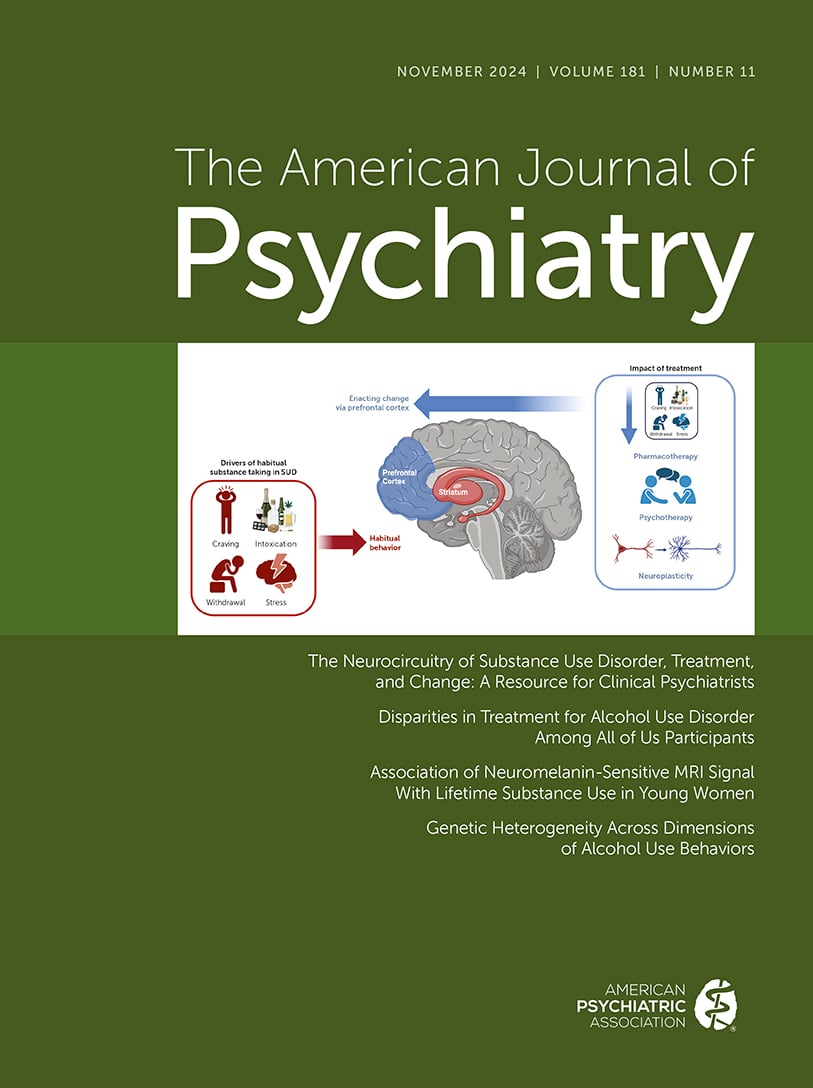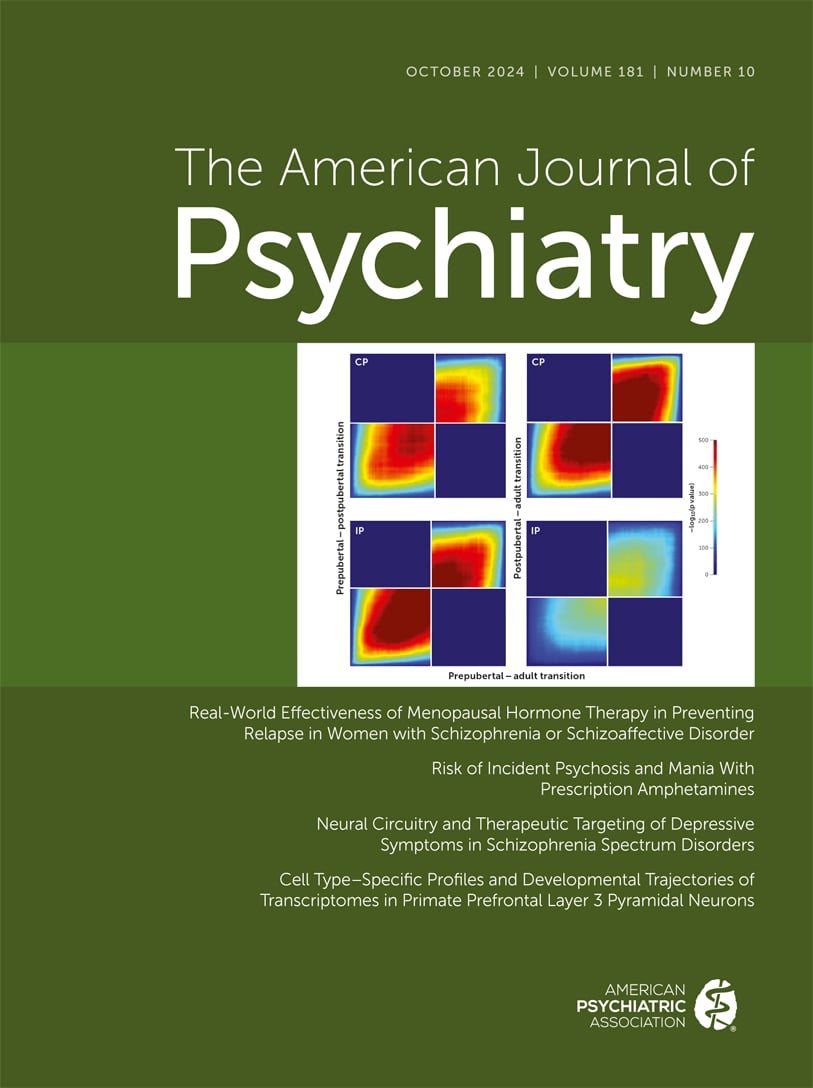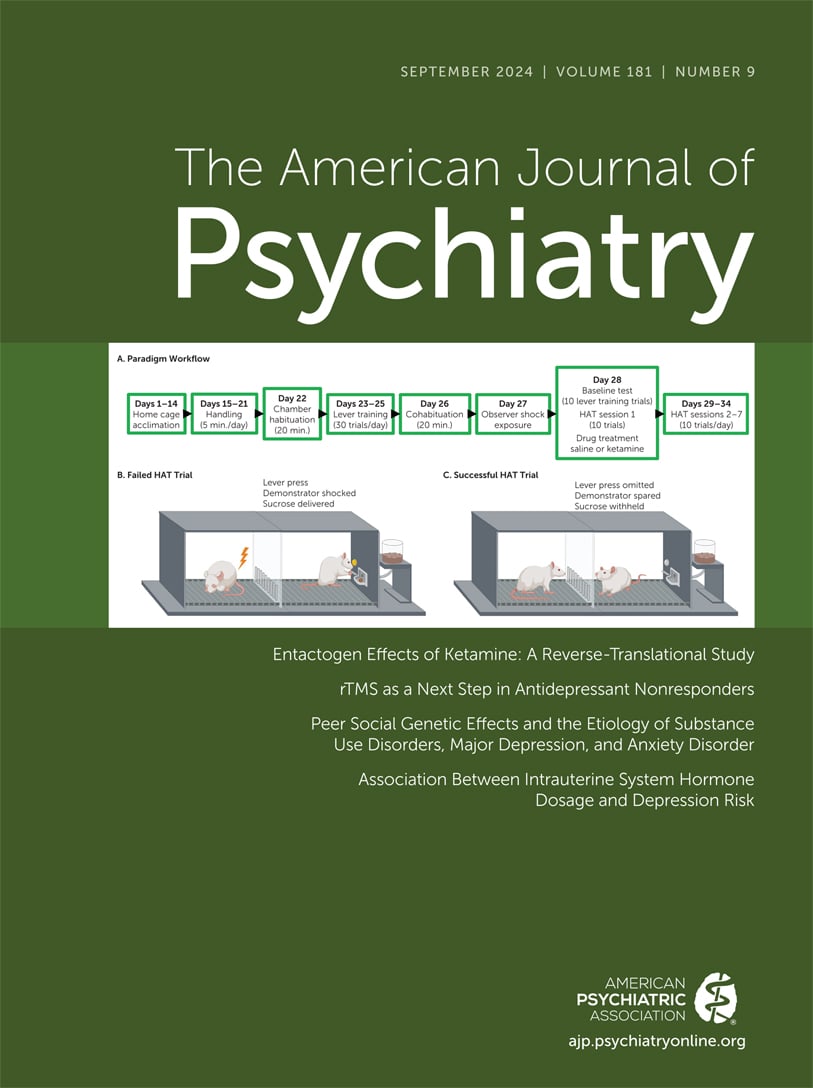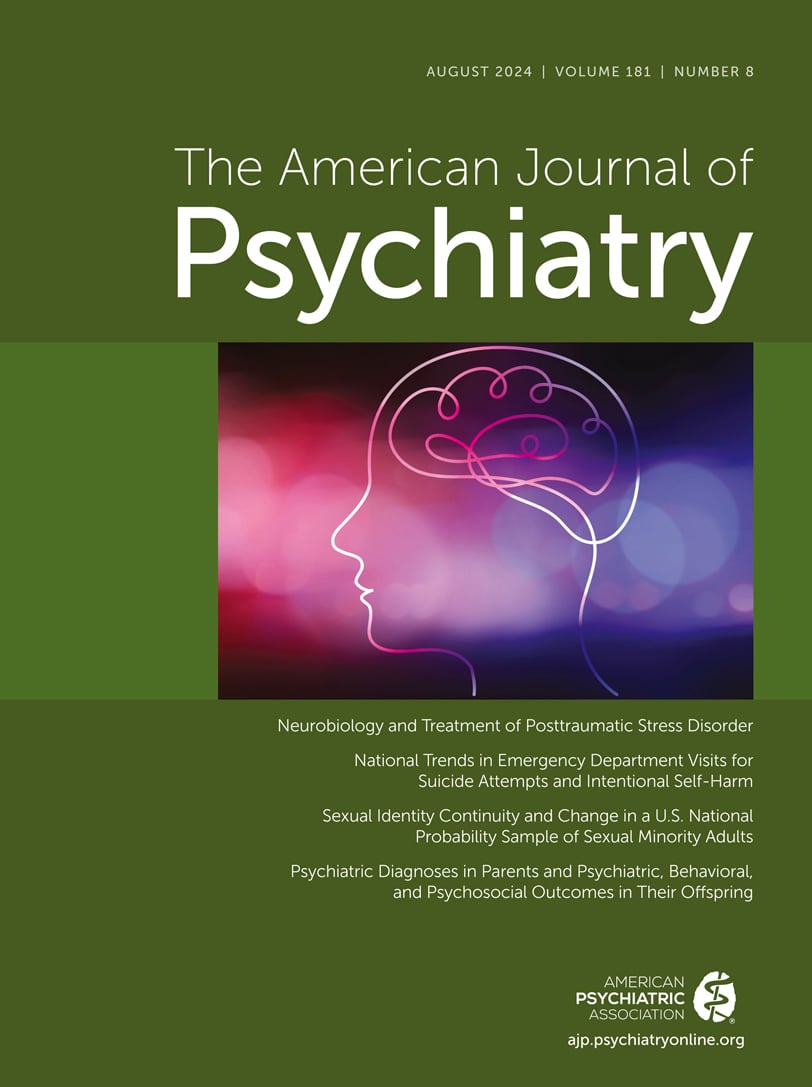American Journal of Psychiatry
- Volume 145
- Number 3
- March 1988
Publication date: 01 March 1988
Pages281–285There is growing evidence that medication can alleviate symptoms associated with posttraumatic stress disorder (PTSD). Recent research also suggests that PTSD has a unique biological profile consisting of alterations in sympathetic arousal, the ...
https://doi.org/10.1176/ajp.145.3.281Publication date: 01 March 1988
Pages286–292Clinicians have traditionally inquired about stressful life events preceding the onset of a psychiatric disorder. Axis IV of DSM-III attempted to improve on this by suggesting that a wide range of events be considered and that the information obtained be ...
https://doi.org/10.1176/ajp.145.3.286Publication date: 01 March 1988
Pages293–300Ninety-one patients with panic attacks limited historically to depressive episodes had more severe depressive symptoms and were less likely to recover during a 2-year follow-up than 417 depressed patients who did not have panic attacks. Family study data ...
https://doi.org/10.1176/ajp.145.3.293Publication date: 01 March 1988
Pages301–305The authors compared the hypnotizability of 65 Vietnam veteran patients with posttraumatic stress disorder (PTSD) to that of a normal control group and four patient samples using the Hypnotic Induction Profile. The patients with PTSD had significantly ...
https://doi.org/10.1176/ajp.145.3.301Publication date: 01 March 1988
Pages306–311Sixty patients with probable atypical depression--defined as meeting Research Diagnostic Criteria for depressive illness, having reactive mood, and having one of four associated symptoms (hyperphagia, hypersomnolence, leaden feeling, and sensitivity to ...
https://doi.org/10.1176/ajp.145.3.306Publication date: 01 March 1988
Pages312–317Sixty-two anxious patients were treated under double-blind conditions for 4 weeks with either clorazepate or lorazepam. Two-thirds of each treatment group were then switched abruptly to placebo for 2 weeks, while one-third continued to receive active ...
https://doi.org/10.1176/ajp.145.3.312Publication date: 01 March 1988
Pages318–324In order to identify depressed patients with hypothalamic-pituitary- adrenal (HPA) axis abnormalities who have a normal response to the dexamethasone suppression test (DST), the authors administered a series of neuroendocrine tests including insulin-...
https://doi.org/10.1176/ajp.145.3.318Publication date: 01 March 1988
Pages325–330An association between affective disorders and alterations in glucose utilization has been recognized. The authors administered a 5-hour oral glucose tolerance test (GTT) to 28 depressed patients and 21 healthy volunteer control subjects and measured ...
https://doi.org/10.1176/ajp.145.3.325Publication date: 01 March 1988
Pages331–334The author describes common dysfunctions in public psychiatric organizations according to the model of bureaucracy articulated by Max Weber. Dysfunctions are divided into the categories of goal displacement, outside interference, unclear authority ...
https://doi.org/10.1176/ajp.145.3.331Publication date: 01 March 1988
Pages335–338An open study of the therapeutic effects of low-dose neuroleptic treatment was performed on 12 consecutively hospitalized children, aged 7-11, who satisfied DSM-III criteria for childhood-onset pervasive developmental disorder. While receiving an average ...
https://doi.org/10.1176/ajp.145.3.335Publication date: 01 March 1988
Pages339–342The authors assessed 20 carbamazepine-treated patients for the development of hyponatremia. None of the patients had readings below 135 meg/liter of sodium before carbamazepine therapy, but five (25%) did have such readings after carbamazepine therapy. ...
https://doi.org/10.1176/ajp.145.3.339Publication date: 01 March 1988
Pages342–345Low-dose scopolamine, given as presurgery medication, resulted in low levels of serum anticholinergic activity and caused measurable cognitive impairment in 18 psychiatrically healthy elderly patients. The degree of impairment was directly related to ...
https://doi.org/10.1176/ajp.145.3.342Publication date: 01 March 1988
Pages346–349The authors examined the accuracy of the differential diagnosis of chronic insomnia with and without sleep laboratory studies in a consecutive series of 123 patients. All patients were evaluated by means of a sleep/wake log, a sleep habits questionnaire, ...
https://doi.org/10.1176/ajp.145.3.346Publication date: 01 March 1988
Pages350–353Idiopathic basal ganglia calcification is a syndrome consisting of bilateral basal ganglia calcifications, neuropsychiatric abnormalities, disturbances of movement, and normal calcium and phosphorus metabolism. The best described neuropsychiatric ...
https://doi.org/10.1176/ajp.145.3.350Publication date: 01 March 1988
Pages354–357Cerebrotendinous xanthomatosis is a familial recessive disorder. Patients with the disorder present with tendon xanthomas, juvenile cataracts, dementia, and pyramidal and cerebellar abnormalities but have normal plasma cholesterol. High plasma cholestanol ...
https://doi.org/10.1176/ajp.145.3.354Publication date: 01 March 1988
Pages358–360In four depressed patients with abnormal dexamethasone suppression test results before treatment, plasma prolactin levels significantly increased after successful amitriptyline therapy. Such an increase did not take place in five depressed patients with ...
https://doi.org/10.1176/ajp.145.3.358Publication date: 01 March 1988
Pages361–362Carbamazepine resolved within 6-24 hours the catatonic stupor in two patients, one with a schizophreniform and one with a schizoaffective disorder. Reports of frequent EEG abnormalities and the successful use of diazepam in catatonia prompted these trials ...
https://doi.org/10.1176/ajp.145.3.361Publication date: 01 March 1988
Pages363–364Data on psychiatric consultations with 58 pediatric cancer patients are summarized. Although most patients received DSM-III axis I diagnoses, adjustment disorder was diagnosed in 30 cases (52%). The patients with primarily depressive features were ...
https://doi.org/10.1176/ajp.145.3.363Publication date: 01 March 1988
Pages365–366Some dream images are unequivocally linked to events experienced in the waking state but are not identical. The author refers to such alterations as "obligatory associations"; these serve varied psychical requirements, including cognitive transformation.
https://doi.org/10.1176/ajp.145.3.365Article
Article
Article
Article
Article
Article
Article
Article
Article
Article
Article
Past Issues
View Issues Archive
Vol. 181 | No. 11

Vol. 181 | No. 10

Vol. 181 | No. 9
